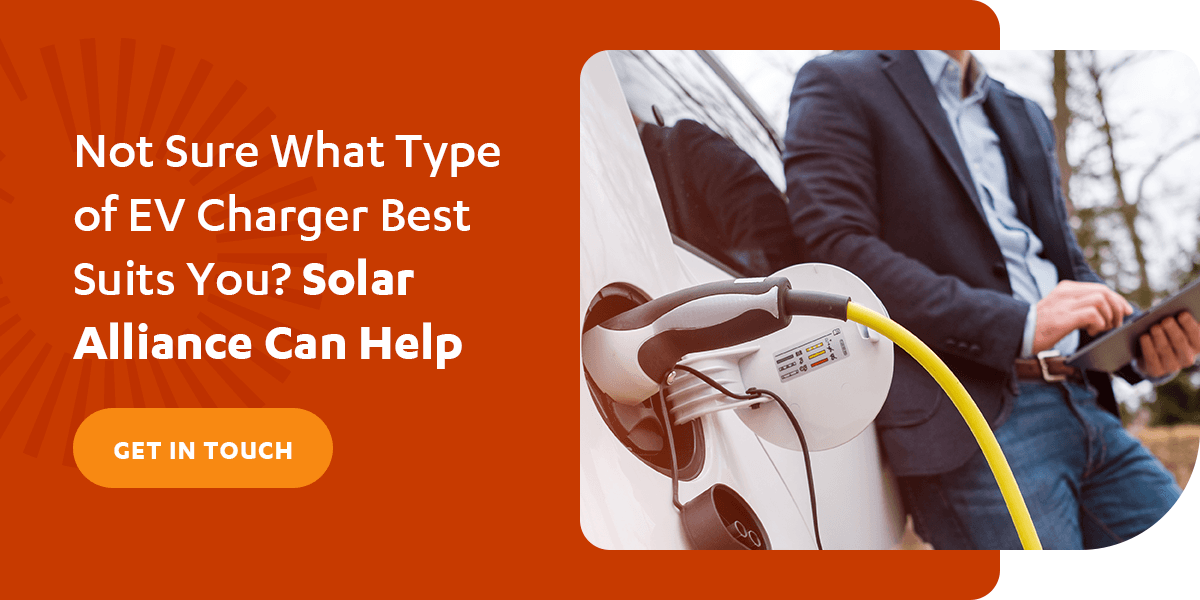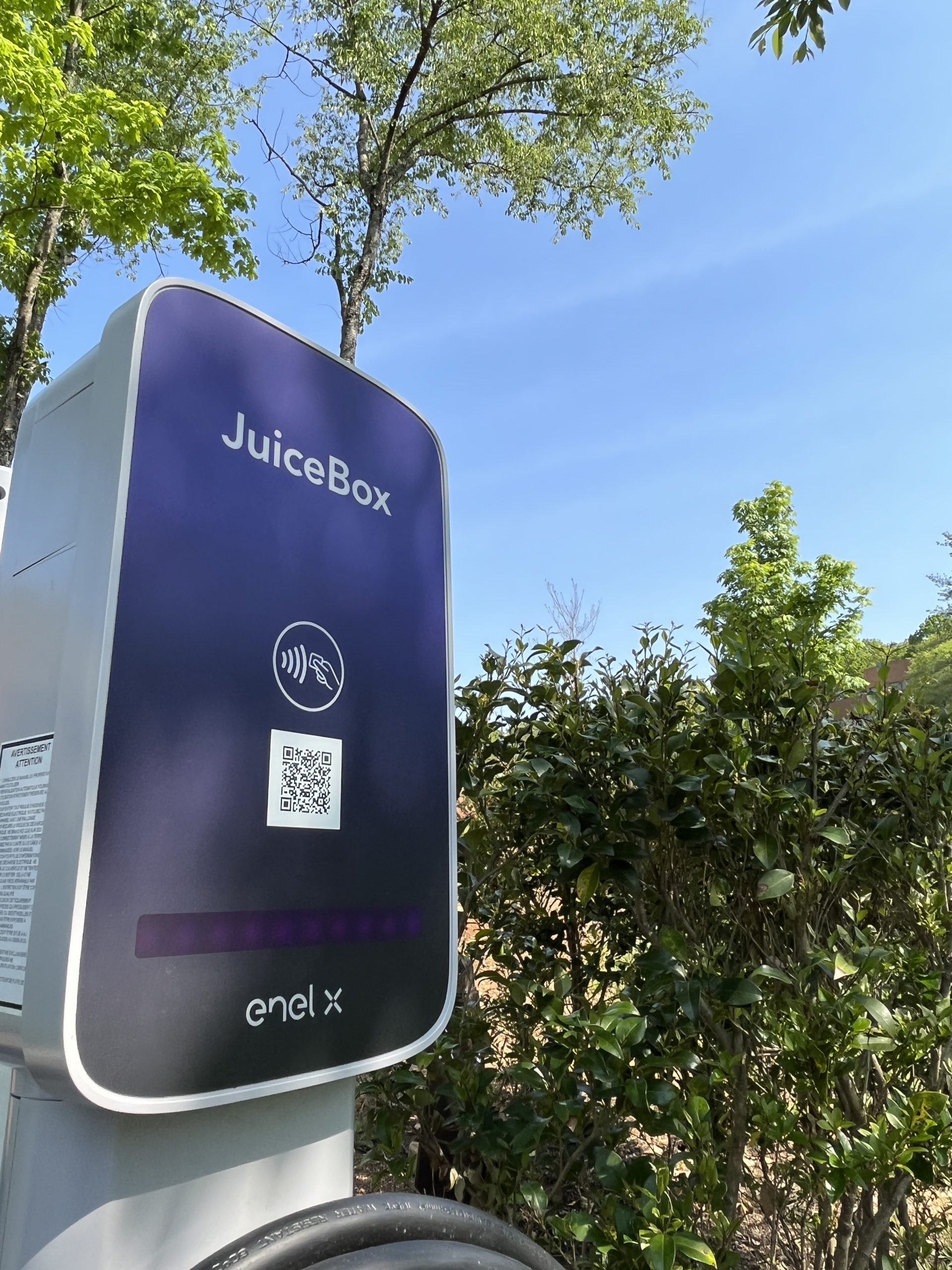
Last Updated on December 27, 2022 by Anne Brock
Electric Vehicle Charging Guide
Electric vehicles are on the rise. Some reports estimate that by 2040, nearly every car sold globally will be electric. With efficient performance, low maintenance and environmentally friendly fuel, it’s clear to see why many see electric cars as the future of the auto industry. Companies like Ford, Chevrolet, Nissan, Tesla and Volkswagen continue to put out impressive electric vehicles with high horsepower and innovative software, showcasing the potential of a car that was once thought of as irrelevant.
One common theme that you hear brought up around electric vehicles (EVs) is how to charge them. With various charging levels, plugs and different units — kilowatts instead of gallons — it’s understandable that many people may be confused about how the charging process works.
Here, we’ll explain electric vehicle charging, from choosing the right charger for your home to the process of installing a commercial charging station at your business.
Electric Car Home Chargers
Owning an electric car offers incredible convenience, as you can charge it at your own home. Come home from work, plug your car in and it will be ready to go the next morning. No wasting time at a gas station — just plug in your car to an outlet and charge it like a phone.
Electric car charger types can be split into two levels — level one and level two. There’s a level three charging type that we’ll get to later, but in home environments, these will be your two main charging options.
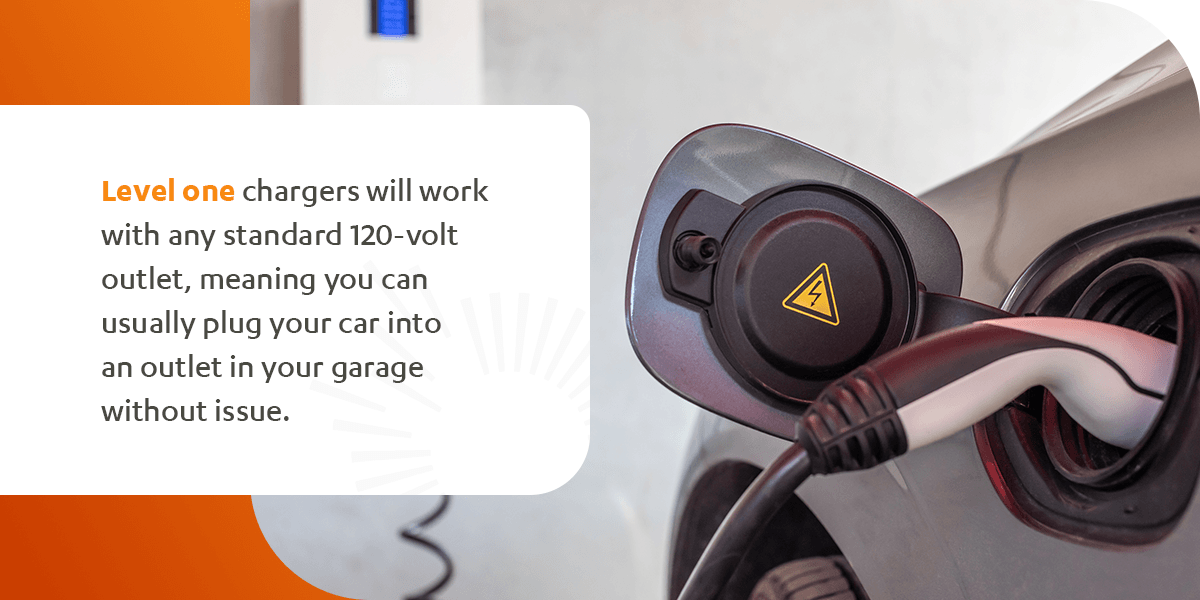
What Is a Level One Car Charger?
When you buy an electric vehicle, it will likely come with a level one charger. Level one chargers will work with any standard 120-volt outlet, meaning you can usually plug your car into an outlet in your garage without issue.
EV charging type one is convenient but also slow — it has a charging speed of around three to five miles per hour. Even if you leave your EV plugged in overnight, it won’t get a full charge.
For some, however, this still may be more than enough charge. If you’re using your electric vehicle for casual driving and short commutes, you might be able to get what you need out of the level one charger.
Here are some of the benefits of the level one charging type:
- Convenience: The level one EV charging type is the most convenient — no extra installation is needed. Simply plug it into your garage outlet, and you’re good to go. This simplicity takes a lot of the stress out of installing a charging station at your home. You’ll already have everything you need to charge your vehicle.
- Affordability: With a level one charger, there are no added installation costs. It’s by far the most affordable charging type since it will typically come with your purchase of the vehicle. For those looking to save some money, level one charging is the logical option.
- Suitability for casual drivers: Many people criticize level one charging because of its slow charge. For many people, though, level one might be all they need. Casual drivers who make a short daily commute each day — or who don’t commute every day — will likely have enough charge to make it where they need to go.
Others might seek out a charger with a little more power for a swifter charge.
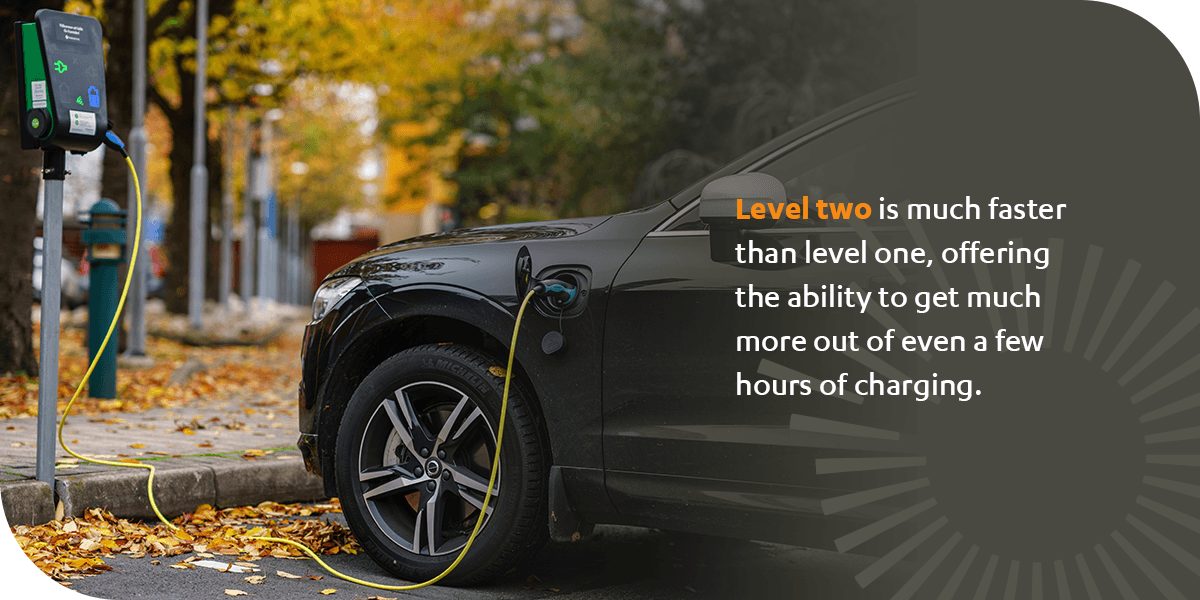
What Is a Level Two Car Charger?
Level two EV chargers will charge much quicker than level one — between 12 to 80 miles per hour. Type two electric vehicle charging will require a 240-volt outlet.
For this charging type, you’ll have to purchase the charger separately from the car and have a technician install it in your own home. This is one of the most popular charging types for EV owners, as it offers a quicker charge. You’ll also see level two chargers at public charging stations.
For both type one and type two car chargers, you can use a standard connector referred to as the SAE JI772. The level two charger is popular for a reason, as it offers many advantages:
- Charging speed: Level two is much faster than level one, offering the ability to get much more out of even a few hours of charging. Many people love this speedy charging convenience. If you’ll be using your electric vehicle a lot, that swifter charge could be very valuable to you.
- Reduced stops: Having a level two charger at your own house is extremely convenient, and it lets you reduce the number of stops you’ll have to take at public charging stations throughout the week.
- Full charge: It will take tens of hours to charge your EV with a level one charger — level two gets you to a full charge much quicker. If you’re someone who wants that full charge for long drives, level two is the perfect option for you.
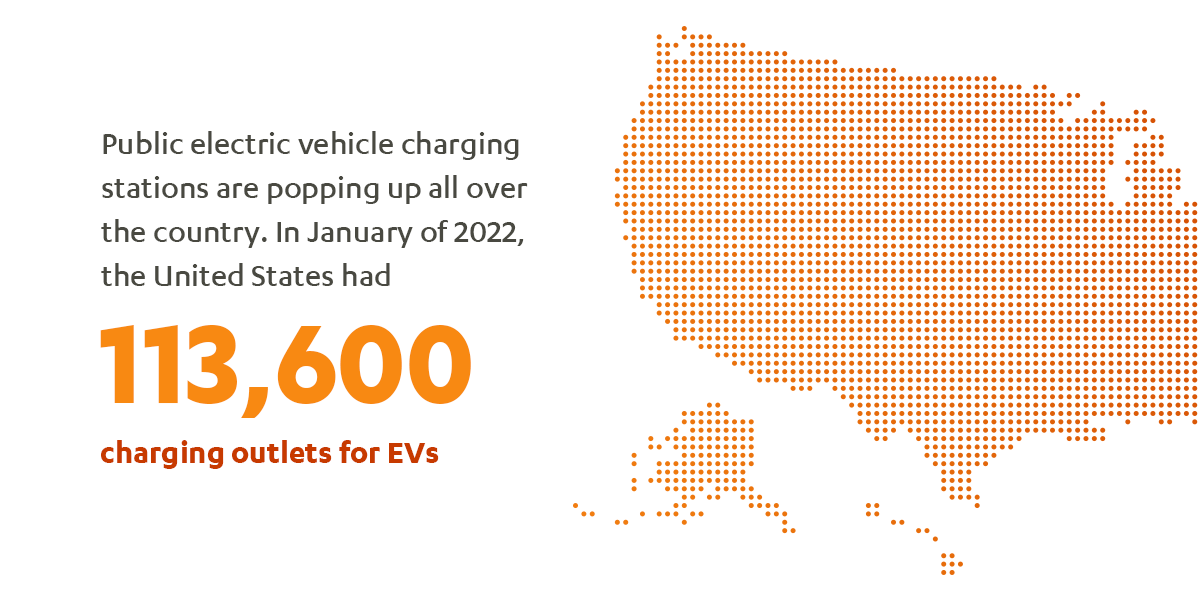
Commercial Electric Vehicle Charging Stations
Public electric vehicle charging stations are popping up all over the country. In January of 2022, the United States had 113,600 charging outlets for EVs. That number is likely to continue to grow, striving to meet the needs of electric vehicle owners across the country. Commercial electric vehicle charging stations can pop up anywhere, even acting as a way to draw people to a business. You might see an electric charging station at these settings:
- Restaurants
- Offices
- Shopping centers
- Hotels
- Parks
- Private homes
- Gas stations
As you can see, electric charging stations can fit into many areas — they just need the investment and infrastructure to do so. As EVs become more popular, business owners will increasingly look to utilize these charging stations for their many benefits.
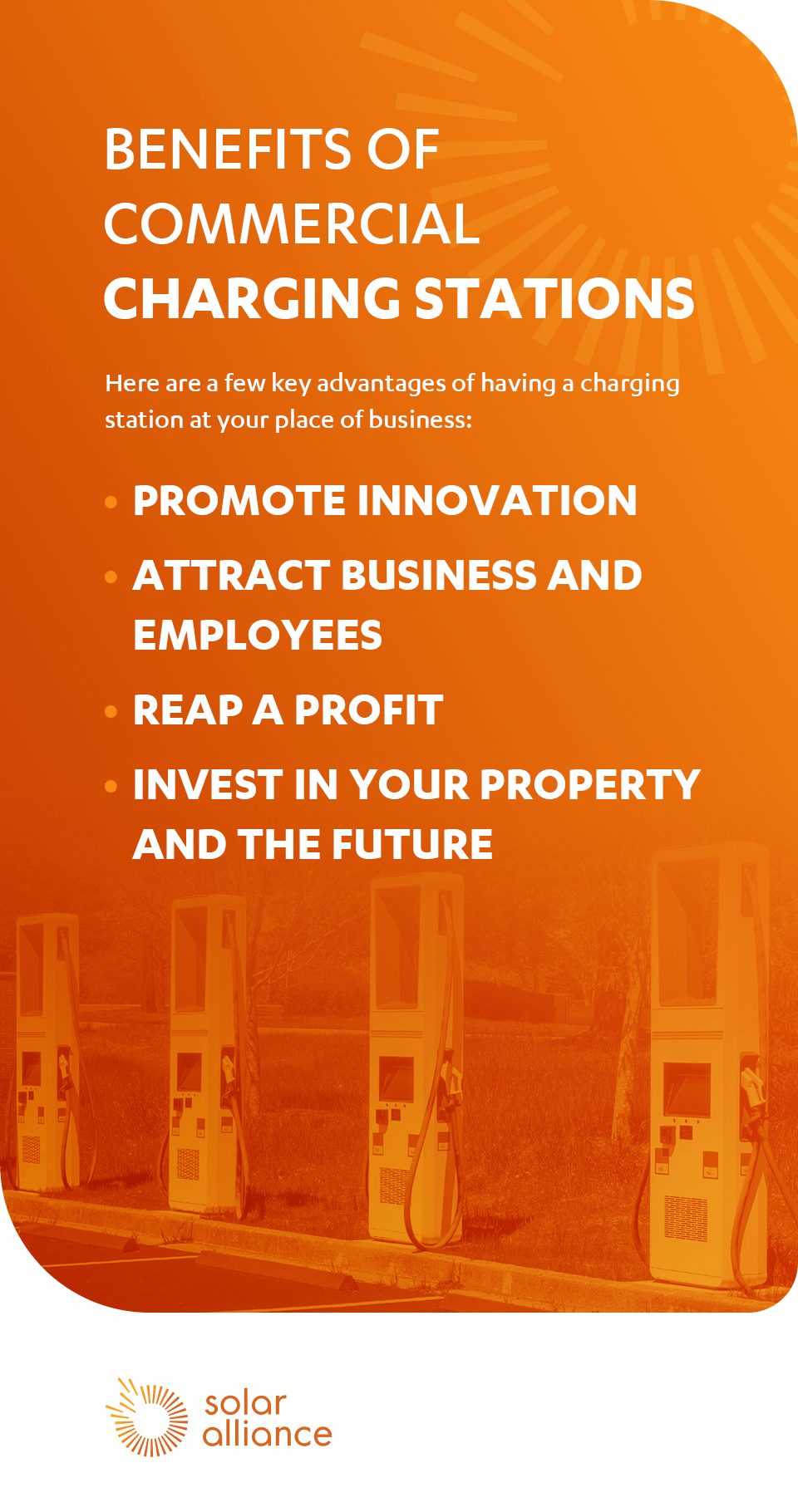
Benefits of Commercial Charging Stations
Here are a few key advantages of having a charging station at your place of business:
- Promote innovation: Many people see EVs as a symbol of the future — clean energy, efficiency and a fresh design. When you build a charging station, you’re aligning your business with that innovation, promoting a forward-thinking mindset.
- Attract business and employees: As more people start buying electric vehicles, they’re going to need a place to charge their cars. Whether you own an apartment complex or a retail store, you can offer that essential function, attracting people to your business to buy, rent or even work with you based on their needs. In some cases, having that charging station might even affect a person’s final decision to patronize or work with your business over others.
- Reap a profit: Those charging stations will also be pulling in money. Choose a business model that lets you generate income by requiring charging fees. With the dual benefit of attracting people, you’ll also be able to make a profit.
- Invest in your property and the future: Building an EV charging station may even raise the value of your property. With EV sales rising, you can get ahead of the curve by building an electric car charger for business and watching your land value rise.
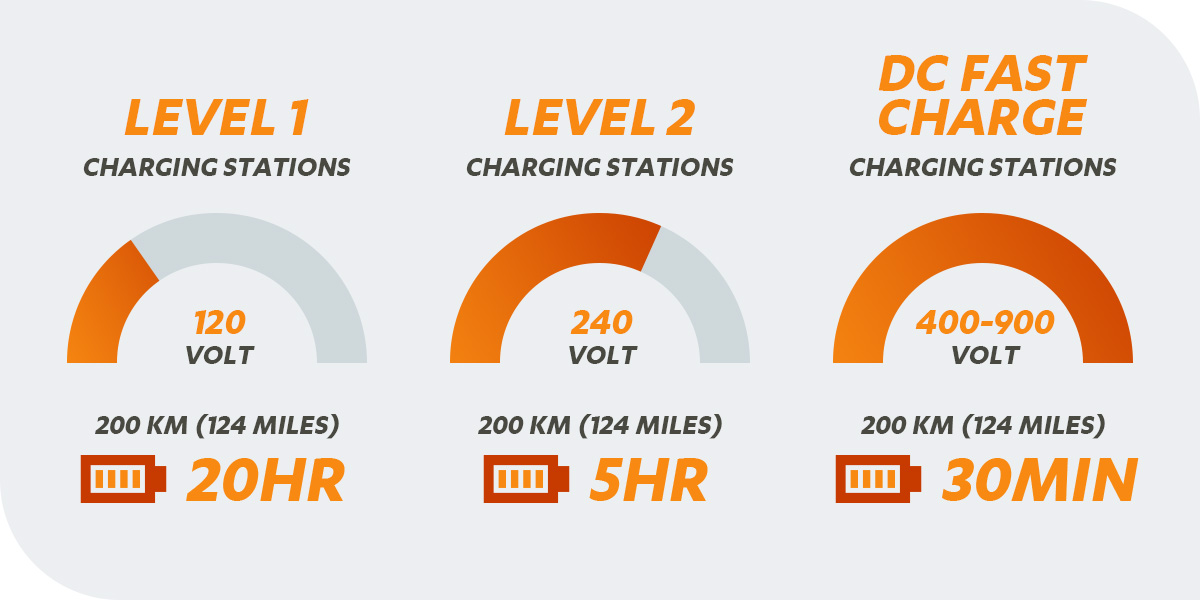
Level One vs. Level Two vs. Level Three Charging Stations
All EV charging stations are not the same. You’ll see three main public types of EV charging stations:
- Type one: This is the most affordable but slowest type of charge. Using a 120-volt outlet, it charges around three to five miles per hour. Although this is the cheapest option for business owners, it usually doesn’t provide the type of speed that EV owners are looking for at a public station.
- Type two: Level two charging stations are the most popular type for commercial charging stations. It’s more expensive than level one chargers but offers a speedier charge at 12 to 80 miles per hour. It will require a 240-volt outlet, which you’ll likely need to have installed at your business. The level two charger lands in a sweet spot of function and cost, making it the go-to for commercial stations.
- Type three: The level three electric car charger is the most expensive charger but also the fastest. Also known as direct-current (DC) fast charge and supercharging, level three can charge up to 20 miles per minute. Level three requires 400 to 900 volts, so you won’t see these types of charging stations at many people’s homes. While all EVs can use level one and two chargers, level three only works with select vehicles. As of now, these level three EV charging stations are relatively exclusive but are becoming more common for EVs.
Something else you’ll want to keep in mind is electric car plug types. This is one of the more complex aspects of the EV process, but it can be easily simplified with relevant knowledge. There are four main types of EV connectors:
- J1772: This connector works for both level one and level two charging stations but will not work for level three.
- CCS: The CCS works for all three levels. This connector has been widely adopted by the majority of major auto manufacturers in North America.
- CHAdeMO: This is the exclusive connector of level three charging and the official standard charger in Japan. EVs by Nissan and Mitsubishi use this connector.
- Tesla: Tesla uses the same connector for all three charging levels. While brands like Ford, Chevrolet and others use the standard North American connectors, Tesla has its own unique plugs.
The EU has standardized their EV connectors with a “Type Two” connector. This simplifies the process for many EV owners, as they don’t have to figure out which connector they can use on their vehicle. As electric vehicles become popular, we may see something similar happen with EV charging standards in the United States.
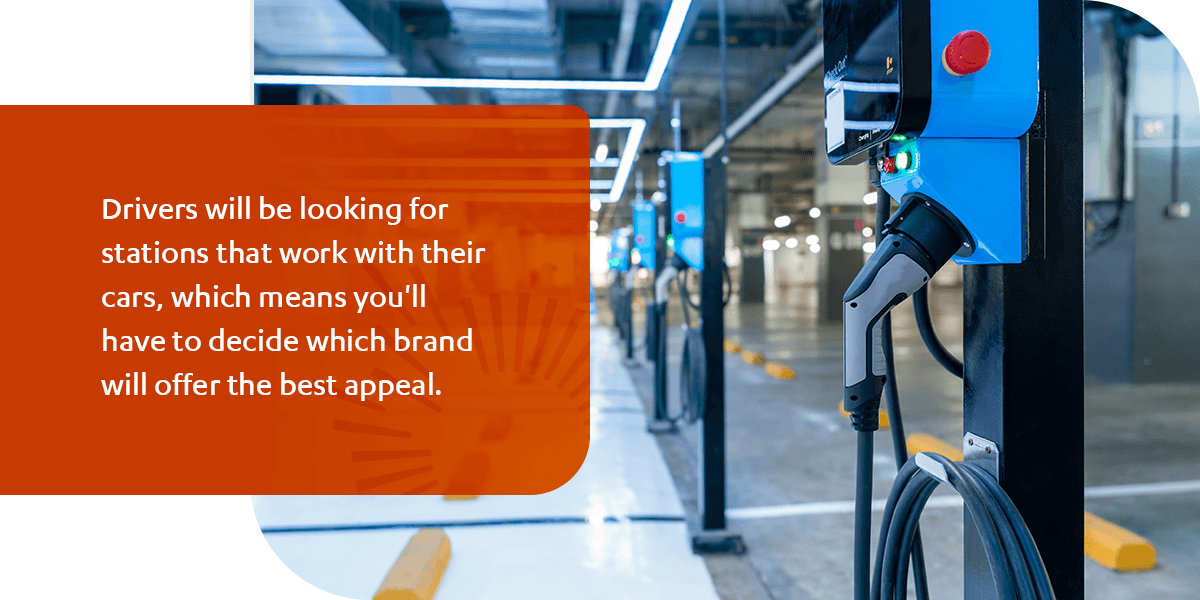
Commercial Charging Considerations
As you weigh your options and decide between these different types of EV charging stations for your business, it’s important to look at what would be most beneficial to your situation. If you’re looking for speed, you’ll likely be weighing EV charging level two versus three, figuring out where your best option lies.
Keep a few key ideas in mind as you consider level one, two and three charging stations:
- Function: The function of your commercial charging station varies widely based on your business. If you’re a fleet manager, you could install a charging station for your EVs to optimize for efficiency. If you’re a landlord, the charging station might be a way to attract potential tenants. A retail store owner could use a charging station to bring customers in.
- Setting: You’ll want to consider the setting of your business when it comes to determining charging levels. Are you in an area with many other EV charging stations nearby? Are you close to a highway? These types of considerations will impact whether you use a level three fast charger or a level two.
- Billing: How will you charge for usage of your electric vehicle charging station? Rates will differ based on the level of chargers you have. You could charge for memberships, per minute or per kilowatt. You could also charge different rates based on the time of day.
- Load management: Another crucial aspect of installing an EV charging station is how much power you’ll be able to put out at one time. You’ll have to calculate this beforehand to know what you’re able to handle. Innovative software can help handle capacity, or you may need to add more capacity to allow for a charging station.
- Brand: This is where that knowledge of EV connectors comes in handy. Drivers will be looking for stations that work with their cars, which means you’ll have to decide which brand will offer the best appeal. Tesla stations offer some of the best performance, for example, but non-Tesla vehicles will require an adapter. A different brand with standard connectors may offer a broader appeal. Ford, Volkswagen and others also have their own branded charging stations.
What Type of EV Charger Do You Need?
Finding the best commercial EV charger will mostly come down to your specific situation. Here are some businesses that could benefit from installing an EV charging station:
- Retail stores: Attract customers with EV power stations. Customers can shop while charging their vehicles. For this situation, it may be beneficial to have a level three charger available so that customers can quickly charge their vehicle while shopping.
- Hotels and apartments: You’ll likely see more and more charging stations at hotels and apartment complexes. Sometimes, these are deciding a factor when people are looking at places to stay or rent. You could vault your business over the competition with a charging station. Since people will be staying overnight, you may be able to settle with a commercial level two charging station for a slower but effective charge.
- Businesses with fleets: Fleets are now turning electric, and with that comes great value in EV charging stations. EV charging stations are a great tool for rental companies and driving services to utilize and a solid investment. Since fleets are looking to be as efficient as possible, a level three charging station may be most effective here.
It’s important to make these electric car charging comparisons and find the best option for you. Once you’ve settled on what you want, it could be time to start the planning process.
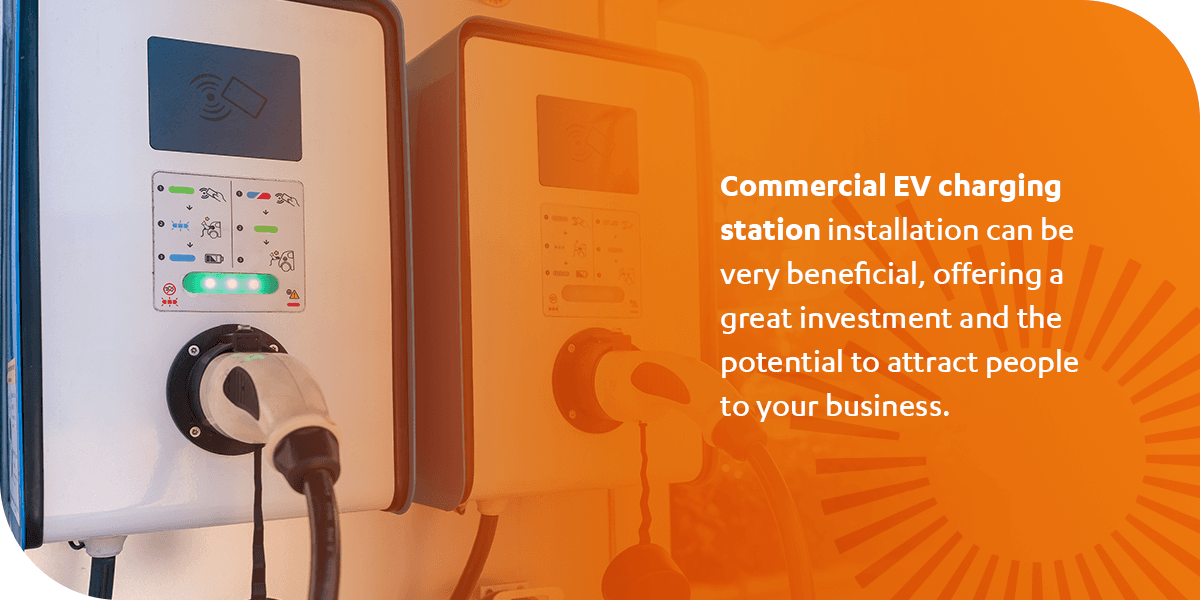
Commercial Installation
The EV charging station comparison process will lead you into installation with an idea of what you need.
Commercial EV charging station installation can be very beneficial, offering a great investment and the potential to attract people to your business. It’s also an involved process, which is why it’s important to break it down into individual steps.
Find a Site
When installing EV charging for a commercial property, your first action should be to find a site. Find that location on your property you think is ideal for electric vehicle charging station installation. Ideally, it’ll be somewhere easily accessible in your parking lot without blocking essential pathways or cutting down your parking space too much.
Also look for factors such as proper lighting, security and electrical infrastructure. If your location is lacking any of these needs, you can always add them and bring in additional power to sustain the charging stations.
Get Permissions
Depending on your business and location, you might need certain permits and permissions before installing electric vehicle chargers. Speak with your land or property owners and look into local laws.
Plan Infrastructure
After you’ve found your spot and determined that you can install EV chargers, you can start going over the more detailed plans for your commercial car charging stations. This includes aspects such as landscaping, pouring concrete and boring holes. You’ll check off infrastructure requirements and make an intricate plan for electrical distribution.
Identify Incentives
Because of their environmental benefits, governments around the world are helping to promote the usage of EVs by offering incentives for those that build charging stations. As a business owner, you can receive:
- Federal tax breaks
- Grants that cover construction costs
- Local credits
- Utility company rebates
Much of this will depend on your location, but you’ll likely find many incentives to help you construct your charging station.
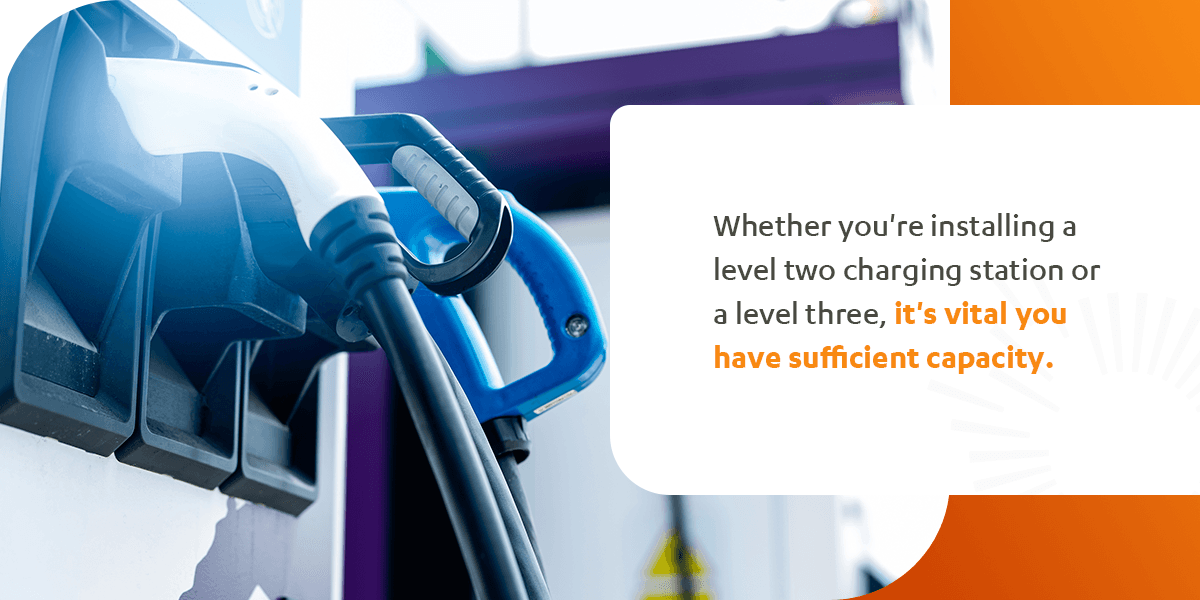
Prepare Your Business
It’s crucial to have an environment conducive to multiple charging stations. You want to make sure you have the power capacity to handle whichever level of charger you’re installing and that it can handle multiple chargers at once. Whether you’re installing a level two charging station or a level three, it’s vital you have sufficient capacity.
Install
After you have a solid plan in place and receive approval, it’s time for installation. You can order the materials, and engineers will start putting the designs into motion. Charging stations, lights, security cameras and all the necessary additions will be completed.
Advertise Your EV Chargers
All the time and investments are only worth it if you draw in customers with your new chargers. Announce the additions on social media and update relevant amenities sections on your website.
EV Charging FAQs
EV charging can be a challenging topic. With all the various levels and connector types, there’s a lot to keep track of. Here are some commonly asked questions.
1. What Is the Fastest Electric Car Charger?
Level three EV chargers offer the fastest charging time. Using anywhere between 400 to 900 volts, the level three charger can give you a nearly full charge in minutes rather than hours.
2. Are Electric Car Chargers Universal?
In some areas, such as the EU, electric car chargers have a universal, standardized charger, which all EV owners can expect to find at their nearest charging station. The United States still has various types of levels and plugs, making it a bit more challenging for EV owners to know which chargers will work for their vehicles.
3. Do all Electric Cars Have the Same Plug?
Not all electric cars have the same charger. In North America, there are four main charging connectors for electric vehicles — J1772, CCS, CHAdeMO and Tesla. They vary based on the charger levels they’re compatible with. The J1772 works with levels one and two, while the CCS is standard and compatible with all levels. The CHAdeMO works only with level three. Tesla connectors work for all levels but are exclusive to Tesla vehicles. Other brands like Ford and Chevrolet use the standard North American plugs for their customer’s convenience.
Not Sure What Type of EV Charger Best Suits You? Solar Alliance Can Help
Solar Alliance knows that electric vehicles are the future. That’s why we offer convenient EV charging solutions for homes and businesses. With solar and non-solar powered car charging options, we have what you need for your commercial or residential property.
If you’re unsure about which EV charger will work best for you, feel free to consult our expert team. We can help you look at your options and find a solution that’s right for you. Reap all the benefits of your electric vehicle by choosing the right charger. Contact us today!

